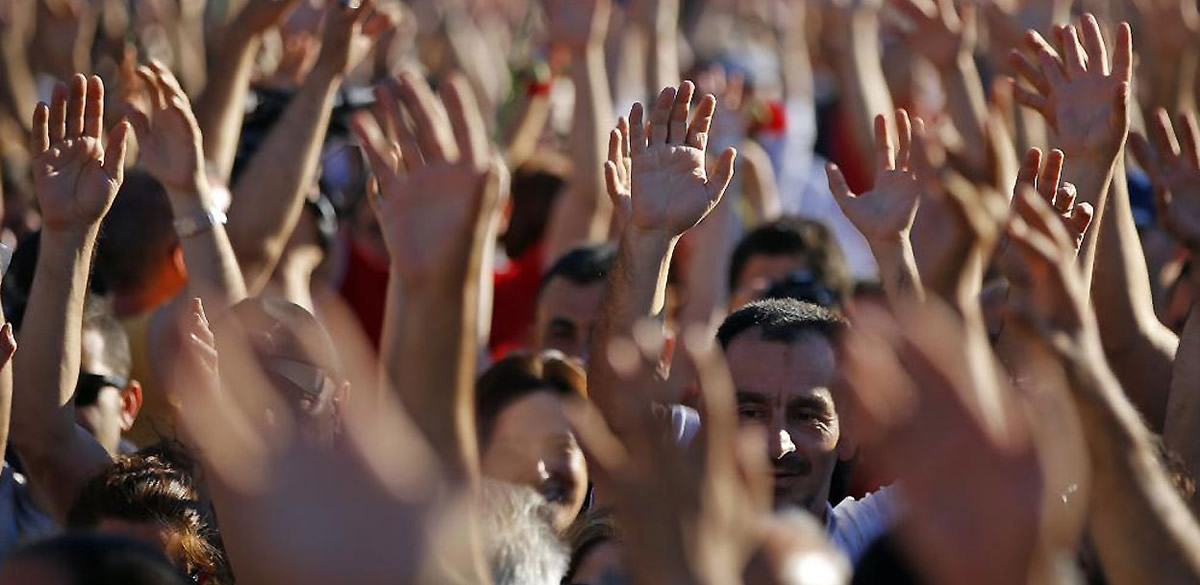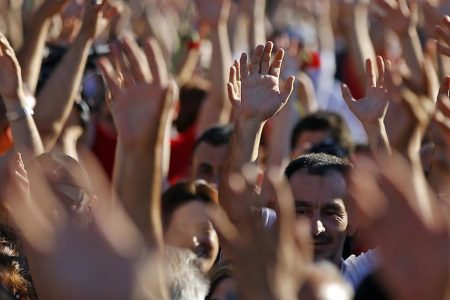There is general sense of distrust when it comes to islamists. Liberals in Arab countries as well as western countries are weary of political Islam. There is a belief that these parties’ doctrine is incompatible with democracy.
The general perception is these parties are not true to the democracy they claim. Therefore, even when they file for elections and participate in the political process they do it from a utilitarian perspective and are not willing to respect the rules of the game once they are in power .For liberals those Islamists deal with democracy and the freedom it entails in a Machiavellic manner. Their aim is to control power and to enforce their totalitarian agenda that confines personal freedoms and imposes strict Islamic precepts such as making the hijab mandatory, segregating genders, prohibiting alcohols among other practices.
However in the West, Christian parties are a normal part of the political process. No one is weary of them. No one is weary of the European people’s party or the Christian democrats. People look at them as part of the civil society and as legitimate representative of a certain constituency.
The question is why we are so weary of political parties while in the west they are looked at like any other normal player? Some might claim Islamic parties are dangerous while their Christian counterpart is benign due to a difference in the nature of the doctrine. The Islamic does not recognize the separation between state and religion. This is why Islamic parties behave differently from their Christian counterparts. This is a debatable argument as several Islamic clerics among which Grand Ayatollah Al Sistani have called for a civic state. The main reason does not lie in the difference between Islam and Christianity but in the difference in political maturity between the Arab world and the west and hence the difference in mentality. Islamic parties are by-product of their environment.
The problem is that the Arab world does not have states. Hence people and political parties do not have the mentality of a state. The entities governing countries in the Arab world are not states but mere illusions of states. They are political regimes. They are political systems designed to preserve and perpetuate the prevalent power structure. Once Qaddafi said that democracy in the Arab dictionary means “Daymumat al kursy” i.e the eternity of the chair, meaning the chair of power.
The Arab world does not have solid states with deep rooted institutions that can prevail no matter what political party takes power. In the Arab world the character of the state changes with the person in power unlike the west where the person who comes to power has to operate within the framework of the state and its institutions.
In France, for example, even if Fillon takes power that does not mean that the French state will change from being secular to being a catholic one. In countries with strong states the winning political party can changes policies on the fringes but cannot change the character of the state. Even Turkey a Muslim country with a fairly recent history in democracy was able to preserve its secular character despite the accession to power for thirteen years of an Islamist candidate.
The other problem is with the mentality. Not growing in a democratic system, these parties look at the victory in the elections as a power of attorney from the people to impose the agenda they want and change and tweak the political system to fit their plan. However in the West the winning candidate does not look at the victory as a sort of green light from the people to exercise absolute power but as a mandate to serve the country within the role set by the state for him.
Therefore the fear from Islamists and the harm they can inflict can be almost mitigated if we had real states with democratic process and a strong civil society. Here we fall in a catch 22 scenario. Many liberals do not welcome democracy as it might result in the election of Islamists. At several instances the results of the democratic process were rejected because they produced an Islamist government. This is what happened in the elections in Palestine, Algeria and Egypt. However putting countries under secular dictatorships does not make a society immune to Islamists’ calling.
The starting point for a strong state is a civil society. A civil society is the backbone for solid state institutions and laws. Promoting a civil society is led by supporting its organisations such as professional associations, unions, women organisations, community service organisations among others.
Democracy cannot be introduced unless a foundation to support it exists. The one person one voting system in Iraq resulted in sectarian thugs and profiteers being put in power.
Tunisia is an example where the civil society was the greatest protection against the Islamists usurping power. It was not the army but the civil society that protected the character of the state. Al Nahda, the child of political Islam and an off spring of the Muslim brothers was compelled to become a civic party with an Islamic background. What we really need is not a ban on Islamic parties but maturity in our political mentality and systems in order to reach the stage of a state.




